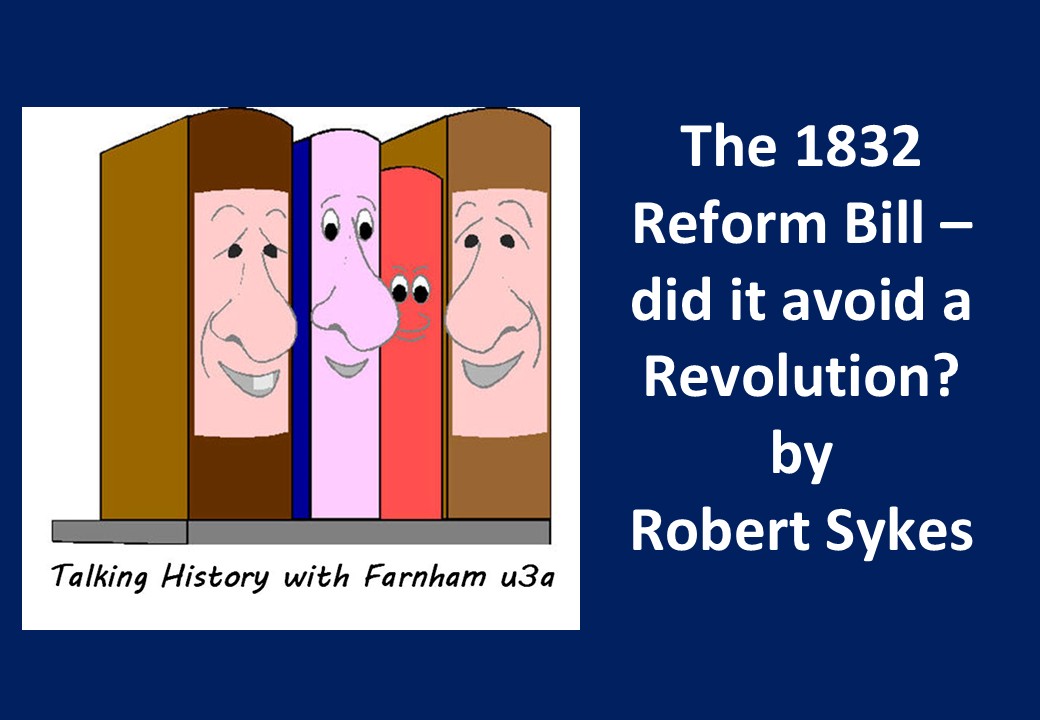Podcast: Play in new window | Download (Duration: 42:35 — 39.0MB)
Season 2024 – Talk 07 – 1832 Reform Bill – – did it avoid a revolution?
In the ‘1832 Reform Bill – did it avoid a revolution‘ Robert Sykes tells us that whilst the parliamentary system in Britain is genuinely old, real democracy is arguably under a hundred years old.
The 1832 Reform Bill:
The first significant reform of the parliamentary system results in the Bill of 1832. Robert spends some time on the system before the Bill. He explains why it needs change. We hear of the growth of the reform movement and the people who want to change the way Parliament is set up.
Before 1832:
This talk is mostly about England. Before 1832 each county has two Members of Parliament irrespective of the size of the population. That’s rather like the US Senate. This means that Yorkshire with 20,000 voters has the same number of members as Rutland with less than a thousand voters. Although this isn’t an ideal situation it gives representation to different parts of the country.
There are also 203 boroughs. These are are determined by different approaches, many historical, across the country.
Whilst, in the Middle Ages a number of boroughs have quite a large number of voters, by the 1830s many have changed.
Potwalloper Boroughs:
In these every male head of household with a hearth large enough to boil a pot has the vote. An example is Preston in Lancashire.
There is corruption to get the votes. The Times tells of two candidates. One extols the virtue of the system saying ‘How wonderful it is that all people can have the vote in this way, that you can act independently’.
The other says ‘Never mind him, I’ll give you something to put in your pot.’ An open bribe for his vote.
There is no secret ballot and voting is visible to everyone.
Rotten Boroughs:
There are many so-called rotten boroughs. These date from the middle ages and have changed significantly.
Dunwich in Suffolk becomes parliamentary constituency in 1296 when it has a thriving port rivalling London. It then falls into the sea as erosion takes place. In 1831 there are only 44 houses there. It still elects two Members of Parliament.
One is the Downing family who chose an MP from their relations and the other is in the gift of the Duke of Newcastle. He sells the right to be an MP for a thousand pounds.
A system in need of change:
There is much political wrangling. Those who appear to favour change may be holding it back whilst others who are against change risk revolution and a run on the banks.
Listen to Robert tell us the full story which is full of intrigue and possible double dealing.
About this podcast:
Unfortunately the images used in the original presentation are subject to copyright and therefore cannot be published alongside this podcast.
This is an edited recording of a talk given to the Farnham u3a World History: Ancient, Medieval and Modern Group.
This podcast is also available through Amazon Music, Apple Podcasts, Castbox, Deezer, Podchaser, Spotify, Stitcher , Vurbl , You Tube and others.
AKM Music licenses Media Magazine for use with this talk.
© The MrT Podcast Studio and the Farnham u3a World History: Ancient, Medieval and Modern Group 2018 – 2025

